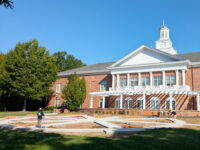
Elon breaks ground on Peace Garden at Lindner Hall | Today at Elon
A new campus garden, planned for completion this fall, will embody peace and justice at Elon University.
Share:
A new campus garden under construction in the Lambert Academic Village will reflect Elon’s values of peace and justice and inspire the community to work towards those goals.
The Peace Garden will feature a custom sundial, olive trees and seating areas in what was previously a lawn behind Lindner Hall. It is expected to be complete in November. The project is the result of collaborations between Elon’s Students for Peace and Social Justice and Elon faculty and staff.
“There are a lot of injustices and inequities in this world, and learning about them can feel heavy,” said Madeline Mitchener ’26, vice president of Students for Peace and Social Justice. “It’s easy to start losing joy. But I love the idea that this garden can be a place for the Elon community to find peace in all the chaos. I hope people meet here, surrounded by the olive trees, and find tranquility and the undying hope for a more peaceful world.”
Mitchener, a double major in public health studies and public policy, and others in the student organization spearheaded the effort under the guidance of faculty adviser Professor of Sociology Tom Arcaro. Over the summer, Director of Landscaping Services Scott Stevens developed detailed plans which were approved by the university’s administration. Rev. Kirstin Boswell, university chaplain and dean of multifaith engagement, provided guidance to ensure that the garden’s purpose was uplifted and articulated.
“The choice of location is just absolutely perfect,” Arcaro said. “It’s a beautiful, open, sunny area that will attract many visitors. When we saw the original designs, it was clear that this was something special. This garden is a symbol of these students’ dedication and an extension of their efforts over the years. My hope is that it will serve as a gathering place for future generations of students who share a commitment to peace and justice.”
One of the garden’s most symbolic features, the olive trees, is also among the most modest in cost.
“Peace isn’t something you can buy; it’s something that grows slowly, nurtured by the hands and hearts of those who seek it,” Arcaro said. “Like the olive trees, peace is rooted in resilience, offering its shade and shelter to anyone who chooses to pause and embrace it.” These trees, along with the other elements of the garden, will stand as a living metaphor for peace — freely given, deeply rooted, and essential to all.
A reception is planned in the coming months to celebrate the garden’s completion.



